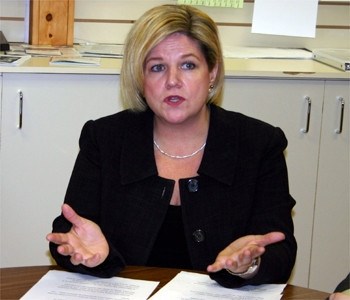The leader of Ontario’s New Democrats is calling the harmonized sales tax – to be implemented July 1 – a job killer.
"All we need to do is look at the job situation in your communities and realize there’s already a job crisis here and the last thing we need is a government that’s going to bring in policies that in fact make the job situation worse instead of better," said Andrea Horwath, visiting Thunder Bay’s CEP Action Centre Friday morning, the first of several stops throughout the city.
Horwath said the HST will hit small businesses hard, particularly tourism operators in the region because there are no gains; the eight per cent tax is passed straight to the customer.
"It’s going to likely mean a reduction in the frequency those clients come for service," she said. "If prices go up, demand goes down. Small businesses know that."
For tourism operators, the competition will become more fierce since Manitoba, offering similar tourism attractions, has no harmonized tax and has no intention of implementing one.
"That puts Northern Ontario tourist venues at an economic disadvantage to the tune of eight per cent," Horwath said.
"Creating a reduction in consumer demand at a time when we’re told the thing you want to stimulate economic activity is people to be consuming in the market," she added. "How is this going to help? It is not a good thing when we’re trying to climb out of a recession."
HST will also make life less affordable for people in Northwestern Ontario where prices are already higher on many services, Horwath said.
"Whether you’re talking about gasoline, whether you’re talking about home heating costs, whether you’re talking about electricity costs, we know that life is more expensive in Northwestern Ontario, so the harmonized sales tax is going to have a double hit for families in Northwestern Ontario," she said.
While HST seems to be a done deal, Horwath said she’s going to be fighting it until July 1.
Sign in or register
- Messages
- Post a Listing
- Your Listings
- Your Profile
- Your Subscriptions
- Your Likes
- Your Business
- Support Local News
- Payment History
Registered Users
Already have an account?
New Users
Create a free account.
